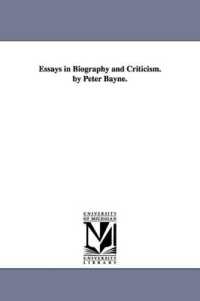- ホーム
- > 洋書
- > 英文書
- > Psychology
Full Description
In this chapter, we described issues in conducting intervention research with students with learning disabilities on the secondary level. We main tained that interventions should be well-grounded in theories of learning as well as characterizations of learning disabilities (Pressley, Scruggs, & Mastropieri, 1989); that they should first be conducted in a series of highly controlled, laboratory-like experiments to carefully assess the potential utility of the intervention; and that, if the intervention is suc cessful in highly controlled settings, it should then be evaluated in class room applications. We maintained that research designs should evolve as the research questions become more applied, and that the results of laboratory research should be used to support the findings of classroom applications. Finally, we described several research designs that we have found useful in conducting classroom intervention research. There is a great deal more to conducting intervention research, of course, than experimental or quasi-experimental design. Intervention strategies likely to be effective must be identified, relevant literature must be reviewed, experimental materials must be developed, and cooperative schools, teachers, parents, and students must be located. Nevertheless, inadequate research designs can invalidate the best and most successful efforts in all of these areas, while effective and practical research designs can do much to document the best practices and advance our knowledge of effective interventions with students with learning disabilities. References Brigham, F. J. , Scruggs, T. E. , & Mastropieri, M. A. (1992).
Contents
I Models and Theories.- 1 Learning Disabilities Theory: Issues and Advances.- 2 Neuropsychological Theories Associated with Learning Disorders.- 3 Models and Theories: Their Influence on Research in Learning Disabilities.- II Methodological Issues: Descriptive Research.- 4 The Role of Classification in Learning Disabilities.- 5 A Screening Test Built of Cognitive Bricks: Identification of Young LD Children.- III Methodological Issues: Intervention Research.- 6 Instructional Issues in Conducting Intervention Research at the Elementary Level.- 7 Issues in Conducting Intervention Research: Secondary Students.- 8 Cognitive Strategy Instruction: Methodological Issues and Guidelines in Conducting Research.- IV Methodological Issues: Case Study, Qualitative, and Longitudinal.- 9 Using Single-Subject Research Methodology to Study Learning Disabilities.- 10 Qualitative Research and Learning Disabilities.- 11 Methodological Issues in Longitudinal Research On Learning Disabilities.- V Assessment and Instrumentation.- 12 Academic Assessment and Instrumentation.- 13 The Study of Cognitive Processes in Learning Disabled Students.- 14 Social Assessments of Students with Learning Disabilities: Do They Measure Up?.- VI Ethical Issues.- 15 Ethical Considerations When Conducting Research with Students with Learning Disabilities.- 16 Ethical Issues Related to Translating Research in Learning Disabilities into Practice.








